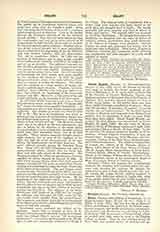

Granvelle, Antonie Perrenot De, known in history as Cardinal De Gran (“Granvella), b, at Ornans in Franche-Comte, August 20, 1517; d. at Madrid, September 21, 1586. He was the son of Nicolas Perrenot, prime minister of Charles V, studied at Padua and Louvain, and at an early age was introduced by his father to political life. Ecclesiastical favors and benefices were showered upon the young man. He became prothonotary Apostolic in 1529, archdeacon of Besancon, archdeacon of Cambrai, and was made Bishop of Arras in 1538 at the age of twenty-one. He resided very little in his diocese and lived at Brussels, where he had an active share in his father’s political negotiations. He was charged with addressing the Council of Trent in the name of the emperor (January 9, 1543), and took an active part in all the important affairs of Charles V, e.g. the interview of Nice, the Peace of Crepy (1544), the Interim, and the marriage of Philip II with Mary Tudor of England. In 1550 he succeeded his father as keeper of the emperor’s seal, but did not bear the title of chancellor. His influence continued to grow under Philip II. He was named Archbishop of Mechlin in 1559 and cardinal in 1561.
As member of the Council of State of the Low Countries he was the most valued counsellor of the regent, Margaret of Parma; apropos of this it must be remembered that when leaving the country Philip II recommended his sister to refer all important affairs to a council of three, one of whom should be Granvelle. He was in direct correspondence with the king, and freely judged and criticized the regent. So much power aroused the jealousy of the nobility, especially that of the Prince of Orange and the Comte d’Egmont, the chief personages of the Low Countries, who were indignant at seeing Granvelle preferred before them. Every means was employed to stir up popular opinion against him, caricature, song, and pamphlet. The regent and even the king himself were besieged with protests. Finally the nobles declared that they would refrain from assisting at the Council of State as long as they should meet the cardinal there. The king believed it prudent to sacrifice his favorite in the face of such stubborn and fierce hostility. Accordingly Granvelle was “authorized to visit his mother in Burgundy” (1564). He was never to see the Low Countries again, though on his departure he left behind his papers, books, and pictures, in the hope of a speedy return. He withdrew to his native Besancon, whence he continued to correspond with the king. By the latter he was sent to Rome in 1565, where he took an active part in the formation of the Holy League, which resulted in the celebrated victory of Lepanto. In 1571 the king named him viceroy of Naples, which post he held until 1575 and then returned to Rome. In 1577 Philip II offered to allow him to return to the Low Countries under Margaret of Parma, but the cardinal refused to return to a country which he had left under such humiliating circumstances, and where he could no longer be of use. The king then summoned him to Madrid (1579). At Madrid, as at Brussels, Besancon, Naples, and Rome, he was a faithful and valued counsellor, though towards the end his repute seems to have diminished. Having resigned from his Archdiocese of Mechlin, he received that of Besancon in 1584. He died at Madrid, and was buried at Besancon, but his remains were scattered during the French Revolution.
Comely of person, speaking seven languages, liberal, of an even disposition, unswervingly faithful to his masters, possessing great political penetration, and of an astonishing activity, Granvelle was moreover a generous and enlightened patron of arts and letters. He has been reproached with avarice; in fact he was never satiated with riches and honors, but was unskilled in the art of gaining popularity. Exclusively preoccupied with the service of his masters, he scorned to win the affection of the multitude, and was as much detested in Germany as in the Netherlands. Owing to his great influence he was responsible for everything that was done, even when he had advised against it. Worldly and ostentatious, and more than once accused of laxity of morals, Granvelle possessed the qualities and defects of a prelate of the Renaissance, with a superiority of intellect and sense of his duties as a statesman which deserve respect. His vast correspondence is an inexhaustible source of information concerning the history of the sixteenth century. It might almost be said, writes the celebrated archivist Gachard, that no minister ever wrote as much as the Cardinal de Granvelle. His correspondence has been edited partly in France by Weiss, “Les papiers d’etat de Granvelle” (9 vols., 4to, 1841-52), partly in Belgium, “La correspondence du cardinal Granvelle” (12 vols., 4to, 1878-96), the first three volumes by E. Poullet, the remainder by Ch. Piat.
GODEFROID KURTH

